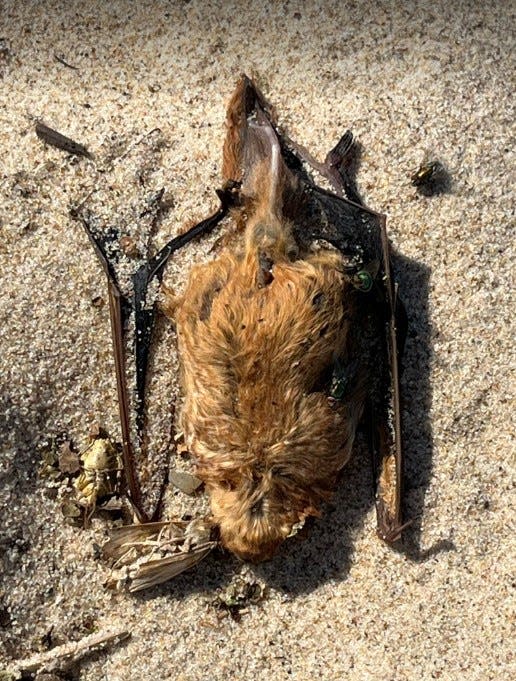Countless dead bats wash up among beachgoers in Michigan City, Long Beach. Storms blamed.

LONG BEACH, Ind. — There were still dead bats along the Lake Michigan shoreline Monday roughly 48 hours after they started being discovered in large numbers by beachgoers in the Michigan City area.
“They’re still up and down the beach,” said Maggie Power, 34, whose family has a summer home at the lakefront in Long Beach.
Power said it was Saturday when she spotted about 30 bats washed up on the sand and floating at the water’s edge during a two-mile walk with her children toward Michigan City.
If the sight wasn’t nerve wracking enough for her, the full-time Chicago resident said a few dead bats floated near her while she was swimming Sunday at the municipal beach just a short walk from her second residence.
“I’ve never seen anything like this,” said Power, who has been going to the home every summer for all of her life.
Anthony Povlock, 26, of Trail Creek, Ind., said he was at Washington Park Beach in Michigan City on Saturday for about one hour before hearing someone reveal finding a bat.
Povlock said he got up and found at least a dozen of them within about a 25-foot radius of where he and his friends had gathered.
“It was quite strange," he said. "It’s not every day that you see dead bats on the beach, you know.”
Other people along that several-mile stretch of shoreline reported finding dead bats sometimes lying in groups.
"When we got to the beach, there was just huge waves. During like the waves and the currents, we just saw these little brownish-red ... bats just in there," beachgoer Maggie Hanson described to a WNDU-TV reporter. "And they’re tiny with little faces, so all the kids were terrified, just picking them up and scooping them up with buckets, putting them on the sand, then grabbing paper towels and throwing them in the garbage. Just crazy I couldn’t believe how many there were."
So far, no estimates have been given on how many dead bats washed in from the lake.
Indiana Department of Natural Resources spokesman Marty Benson said the bats were probably migrating over the lake when caught in the late Friday night and early Saturday morning storms that contained heavy rain, high winds and hail.
He said they were likely eastern red bats, which are migratory.
“They tend to migrate in groups and, unfortunately, when they encounter storms like we had this weekend, large numbers of bats can be affected,” he said.
Benson also said DNR is working to collect more information about the event.
According to DNR, anyone finding a dead bat along the shoreline or anywhere else should not physically handle it.
Instead, such discoveries should be reported to DNR at on.in.gov/sickwildlife and a DNR biologist will reach out to individuals if more information is needed.
According to the Centers for Disease Control, bats are the leading cause of rabies deaths in people in the United States.
LaPorte County Health Department Administrator Amanda Lahners said a bat carrying rabies can transmit the disease from a bite or if they’re body fluids come into contact with the open sore on a human or animal.
Lahners said the risk of contracting rabies from a dead bat is much lower, though.
She said the virus usually dies within 24 hours after the death of an infected bat or animal.
“If it’s hotter, it can be less than that," she said. "If it’s cold or freezing, it can last a little bit longer.”
Power, the summer resident, said she’s also upset no effort appears to have been made by local officials to inform residents about the bats and there’s been, so far, no clean up.
Michigan City Park Department Superintendent Ed Shinn said any clean-up would likely have to be ordered by DNR since the state owns the narrow strip of land from the water’s edge to the high-water mark.
In general, he said, the high-water mark is roughly where vegetation is growing about 100 feet or so away from the edge of the water.
“It varies along the shoreline and it varies from day to day,” he said.
WNDU reporter Mark Peterson contributed to this report.
This article originally appeared on South Bend Tribune: Storms blamed as countless dead bats wash up on LaPorte County beaches
